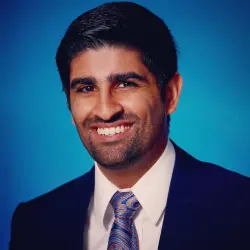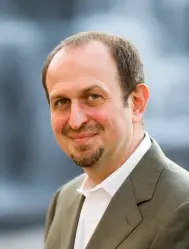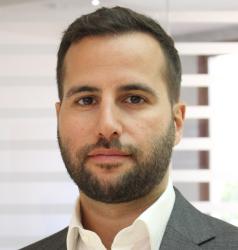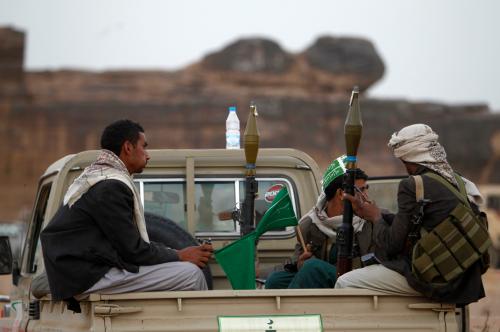Content from the Brookings Doha Center is now archived. In September 2021, after 14 years of impactful partnership, Brookings and the Brookings Doha Center announced that they were ending their affiliation. The Brookings Doha Center is now the Middle East Council on Global Affairs, a separate public policy institution based in Qatar.
On January 10, Secretary of State Mike Pompeo delivered a foreign policy address in Cairo, in which he sought to depict the United States as “a force for good” in the Middle East. Middle East experts at Brookings had a range of quick reactions to the speech, available below.
Natan Sachs (@natansachs), Director of the Center for Middle East Policy: Secretary of State Mike Pompeo came to Cairo to repeat what Obama did there in 2009. Like Obama, he came to repudiate the previous president’s Middle East approach and declare a “new beginning” to American-Middle East relations. Obama wanted to break from the George W. Bush legacy of Iraq and American interventionism. Pompeo attempted to break with Obama’s “self-inflicted American shame,” that—he said—did not recognize America as a force for good, and break with his embrace of the enemy, Iran. While playing politics on foreign soil, Pompeo echoed well the views of elite audiences among regional U.S. partners. They speak worse of Obama and, in theory, would like Pompeo’s approach.
Yet Pompeo has a slight disadvantage in predecessor-rebuking. Obama spoke reliably for the president—himself. Pompeo’s speech sounded like a forceful return to the Bush era, yet he speaks for a president who is nothing like Bush, and possibly nothing like Pompeo in foreign policy. Trump repeatedly questions the utility or benefit of American involvement in the world and, most recently, ordered a hasty withdrawal of troops from Syria, as Pompeo and John Bolton are now at pains to explain away, including in this speech.
While Pompeo’s rebuke of Obama was not without some merit, he might more truthfully ask the same questions of Trump. Indeed, the same regional audiences frequently ask in private whether Pompeo, Bolton, or their predecessors can reliably speak about U.S. policy. For that matter, they’re often not sure Trump himself can.
Tamara Cofman Wittes (@tcwittes), Senior Fellow in the Center for Middle East Policy: Pompeo’s remarks in Cairo presented a vision of an American hegemon fully engaged in the Middle East—very retro, as the kids might say. This vision does not easily match the resources President Trump is willing to invest in the region, nor the relatively lower priority of the Middle East in American global strategy, which is increasingly focused on a rising China, assertive Russia, and new competition in technology and economics.
Pompeo has now set the table for some awkward conversations over the coming days with leaders in the six Gulf Cooperation Council countries. They will quite reasonably thank him for his assurances and aspirations and ask what, other than uncritical rhetorical support, the United States is prepared to commit to realize the vision he sketched. Even if Secretary Pompeo has some answers prepared, the capriciousness and mounting political problems of his boss will likely make regional leaders skeptical about the credibility of those commitments. It’s a sad day when the American secretary of state goes on a major regional tour making bold declarations of American policy, and no one in the region can rationally give them much credit. But that’s the point to which President Trump has brought us.
Wittes: It’s a sad day when the American secretary of state goes on a major regional tour making bold declarations of American policy, and no one in the region can rationally give them much credit.
Sharan Grewal (@sh_grewal), Postdoctoral Fellow in the Center for Middle East Policy: Secretary Pompeo laid out a sharp rebuke of former President Barack Obama’s foreign policy—without once mentioning Obama’s name. His speech’s biggest shift from Obama’s is also what went unsaid: any focus on democracy or human rights.
What Obama emphasized in his Cairo speech, as Secretary Condoleezza Rice did before him, was that governments must “maintain [their] power through consent, not coercion.” Pompeo did not even pay lip service to these values. There was no mention of Jamal Khashoggi, no veiled critique of presidents trying to extend term limits (i.e. Egypt’s President Abdel Fattah el-Sissi), nor even praise for Tunisia’s democratic reforms. Indeed, the only mention of Tunisia was to disparage the “convulsions from Tunis to Tehran,” as if to conflate the former’s transition to democracy with the latter’s transition to theocracy.
Without that fundamental pillar of U.S. foreign policy, we are left with a purely destructive strategy—to fight ISIS and Iran—with no prescription on how to build a brighter future.
Yet Pompeo’s speech was a shift from Obama’s not only in substance, but also style. Obama delivered his pro-democracy message directly to the people by choosing Cairo University near downtown Cairo. Pompeo chose the more elite American University in Cairo in the wealthy suburbs, in a speech primarily addressed to Arab governments, rather than their publics. And that shift was reflected in their audiences’ reactions: Obama’s speech had been punctuated by repeated and genuine applause—Pompeo’s just once, and seemingly forced, when he thanked President Sissi for his courage in helping fight ISIS.
“When America retreats, chaos follows,” Pompeo told us. But when America retreats from its values, repression and despotism are sure to follow.
Jeffrey Feltman, John C. Whitehead Visiting Fellow in International Diplomacy at Brookings: Most Arab leaders heard President Obama’s 2009 Cairo speech with selective listening: They warmly welcomed Obama’s commitment to focus on a two-state solution to the Israeli-Palestinian conflict (an issue even then more of concern to the Arab “street” than in Arab palaces) and his rhetorical respect for Islam. They studiously ignored Obama’s polite but pointed and—in light of the 2011 uprisings—prescient criticisms of worrying deficiencies in human rights and development.
Today, the various Arab potentates don’t need to employ selective hearing with Secretary of State Pompeo’s speech. For an administration apparently convinced that the United States has been on the receiving end of outrageously one-sided deals via alliances globally, it is curious that the Arab partners being wooed by Pompeo were not put on sharp notice about obligations of their own, beyond oblique and brief references to the Gulf divide and Egypt’s NGO law. As satisfied as the Arab leaders predictably must be with the words of the Pompeo speech, they surely will not confuse words for action. Given President Trump’s obsession with destroying Obama’s legacy, Pompeo’s words, by distorting and exaggerating Obama’s Cairo speech, may have been most effective with that all-important audience of one in the White House.
While a minor point, Pompeo’s self-congratulatory line about receiving Egyptian Foreign Minister Sameh Hassan Shoukry in his office in August begs the question: What does he imagine that other secretaries of state did when their counterparts were in town? Pompeo did not mention his November visitor: King Abdullah of Jordan, snubbed by the same White House Pompeo now insists will not repeat the alleged mistake committed by Obama, that of neglecting friends.
Hady Amr (@HadyAmr), Visiting Fellow in Foreign Policy at Brookings: Secretary Pompeo’s Cairo speech largely addressed autocrats, not citizens—that’s why it rings hollow.
A dozen years ago, I advised that the following idea be included in a speech presidential candidate Senator Obama gave in August 2007, which was drawn from a paper I had co-authored: “In the first 100 days of my administration, I will travel to a major Islamic forum and….make clear that we are not at war with Islam, that we will stand with those who are willing to stand up for their future.” President Obama subsequently followed through on that commitment in a speech given before a vast number of civil society leaders in Cairo on June 4, 2009. The regional response was extraordinary. The event we hosted at the Brookings Doha Center following the speech with the U.S. ambassador was one of our most vibrant and largest events to that date.
Secretary Pompeo tried to frame this speech as a response to Obama’s. But let us be clear, the speech Secretary Pompeo gave to an audience of hundreds, not thousands, was not. President Trump gave his response to that speech in what the White House billed as the “Arab Islamic American Summit” in Riyadh in May 2017. That speech, like Pompeo’s, was aimed at the region’s leaders—not its citizens. Trump and Pompeo’s framing of the U.S. relationship with the greater Middle East as largely through its not-particularly-democratic leaders may yield some policy successes in the short term but will ultimately fail to deliver on strengthening the mutual interests of Americans and the citizens of the Middle East in building prosperous, vibrant democracies that can partner with the United States in security and prosperity.
Suzanne Maloney (@MaloneySuzanne), Deputy Director of the Foreign Policy program and Senior Fellow in the Center for Middle East Policy: Nothing in Secretary of State Mike Pompeo’s performance since taking the helm at Foggy Bottom offered much hope that he could articulate a thoughtful vision of American interests in the Middle East and a viable strategy to advance them. He may have brought “swagger” back to the department, as he’s proclaimed on social media, but Pompeo often seems to struggle with syntax.
And still, his speech underperformed—perhaps because the target of his remarks appeared to be the prior U.S. administration, rather than the millions of Arabs, Turks, Iranians, Israelis, and other nationalities that comprise this diverse and conflicted region. Bashing Obama—and, of course, Iran—may win Pompeo points in the Oval Office, but nothing in his speech will persuade the region that this administration can lead serious efforts to address any of the urgent crises, such as the devastating war in Yemen, or to mitigate the long-term social, political, and economic challenges facing the region.
Maloney: What distinguishes the Trump approach as outlined by Pompeo is an abandonment of even the pretense of American judiciousness or dexterity.
Pompeo made clear that the administration’s strategy in the Middle East is to double down on support for America’s traditional partners in the region and to try to galvanize more effective cooperation among them, mobilized primarily against Iran. This isn’t radically different from every prior administration since 1979, and all the same mistrust and petty frictions that constrained earlier efforts will no doubt continue to apply. It bears remembering that Iran’s influence expanded not as a result of the nuclear deal that Trump has now jettisoned, but rather because of the catastrophic overreach of a hubristic American president and the paucity of leadership and good governance in the Arab world.
What distinguishes the Trump approach as outlined by Pompeo is an abandonment of even the pretense of American judiciousness or dexterity. No administration has pursued such a one-dimensional approach or so wholly disregarded the sources of instability that emanate from our regional allies: corruption, repression, uncompetitive economies, and inadequate rule of law to name just a few. The Trump administration’s self-congratulatory rhetoric married with a cynical divestment of meaningful American engagement in problem-solving is a recipe for disaster in the Middle East.
Ranj Alaaldin (@RanjAlaaldin), Visiting Fellow in the Brookings Doha Center: Secretary Pompeo’s remarks presented a much needed corrective to the narrative of disengagement and disconnect that has emanated from the White House since President Trump came to office, notwithstanding the likelihood that this could be upended by Trump in the very near future. In stressing an assertive foreign policy and questioning Russian and Chinese commitment to the region, Pompeo also attempted to restore the notion of U.S. leadership and assertiveness that many of America’s regional allies missed and yearned for under the previous administration.
There were substantial gaps and shortcomings. Underscoring the speech was a values-driven foreign policy whereby the United States stands by its allies through thick and thin, but there was a notable absence of America’s longstanding commitment to stabilization and reconstruction or, alternatively, a strategic, effective, and comprehensive response to conflict and instability to ensure the resulting voids are not filled by America’s enemies. Coming just weeks after Trump declared a precipitous withdrawal from Syria, leaving its allies in limbo, there was little by way of assurances on whether and how the United States intends to stay the course to forestall an ISIS resurgence and contain Iran’s expansionism.
The current administration inherited a messy foreign policy, one that was far from perfect and is arguably responsible for the disaster in Syria. Yet, since Trump came into office, the United States has lost further ground to Iran in Iraq and Syria, has alienated its allies, and has failed to restore its relationship with critical regional allies like Turkey. Save for greater consistency and alignment between the White House and the State Department, many regional countries—allies and adversaries alike—could take Pompeo’s speech with a pinch of salt.
Shadi Hamid (@shadihamid), Senior Fellow in the Center for Middle East Policy: This was a doubling down on President Trump’s “dictators first” Middle East policy. There was almost nothing in Pompeo’s remarks for anyone holding out hope for even a mere mention of democracy as a U.S. goal or aspiration. In this sense, Pompeo’s speech was just as much a rebuke to the administration of George W. Bush as to Obama. In her own Cairo address in 2005, Bush’s Secretary of State Condoleezza Rice declared: “For 60 years, my country, the United States, pursued stability at the expense of democracy in this region here in the Middle East—and we achieved neither. Now, we are taking a different course.”
Hamid: This was a doubling down on President Trump’s “dictators first” Middle East policy.
There were a number of cringe-worthy and tone deaf moments in Pompeo’s version of a “new beginning,” for example when he said “our eagerness to address only Muslims, not nations, ignored the rich diversity of the Middle East, and frayed old bonds.” But perhaps they weren’t tone deaf at all, but rather meant for a much smaller audience than the one Obama was trying to address in 2009—the authoritarian leaders, rather than the publics, of the Middle East.
Also: The United States is not, and generally hasn’t been, “a force for good” in the Middle East. It has often been the opposite—a significant, stubborn obstacle to the region’s progress, development, and democratization. This speech was a reminder of why.
Eric Rosand (@RosandEric), Nonresident Senior Fellow in the Center for Middle East Policy: Much of the initial reactions to Pompeo’s remarks understandably focus on comparisons with Obama’s 2009 Cairo speech or the role of the United States in the region. However, the speech also serves as a stark reminder of some of the misguided elements in the Trump administration’s approach to addressing the very real terrorist threats in the region, an approach that seems driven by politics and assumptions rather than evidence.
Pompeo, like his boss, subscribes to an overly simplistic view that the “twisted,” “radical Islamist” ideology lies at the root of the jihadi violence in the Middle East and that the problem would be solved if more political and religious leaders would “denounce” it, as Egypt’s President Sissi has. Not only does this overstate the influence that such leaders may have in the communities that are most susceptible to terrorist propaganda, it ignores both the role that some countries in the region play in exporting this ideology (even while denouncing it at the same time) and the evidence.
The data on what drives support for terrorism and violent extremism shows that support for this violence strongly correlates with human rights violations and other violence perpetrated by states against their own populations as part of, or in the name of, counterterrorism operation. Perhaps nowhere has this been more clearly demonstrated than in Egypt, where authorities are increasingly using counterterrorism and state-of-emergency laws and courts to unjustly prosecute journalists, activists, and critics for their peaceful criticism. Such behavior creates serious grievances against the state and its security forces, radicalizes historically marginalized communities, and diminishes the societal resilience against violent extremism that President Trump’s own counterterrorism strategy calls for strengthening.
In 2019, leaders of most democracies (apart from President Trump and his team) would highlight the importance of addressing grievances linked to human rights violations and feelings of exclusion and marginalization when discussing how to reduce the threat of terrorism. Yet, I have little doubt that President Sissi and other authoritarian leaders facing terrorist threats—and in some cases exacerbating them through their over-reaction—will happily continue to follow the Trump team’s lead.
Omar Rahman (@omarrahman), Visiting Fellow in the Brookings Doha Center: Secretary Pompeo used the platform in Cairo to offer a sermon on the virtues of U.S. exceptionalism and interventionism. His language was tone-deaf and likely sounded arrogant to a Middle Eastern audience. Convenient to his argument, there was no mention of the catastrophic misadventure that was the U.S. invasion of Iraq, which was one of the primary causes of the problems plaguing the Middle East that Pompeo bemoaned in such strident terms. Instead, he laid the blame for Middle Eastern woes at the feet of former President Obama, who had delivered a speech to the Arab world from that same city a decade earlier. Obama’s words had been about “a new beginning” in U.S.-Muslim relations after nearly a decade of the war on terror, and seven years after the Iraq war. Rather Pompeo essentially asserted that American meddling in the region was good because the U.S. is a righteous actor, incapable of doing harm, except when it stands aside. Rather than reassuring America’s Arab partners, his case for a “reinvigorated” America under President Trump fell flat just weeks after the president declared an imminent troop withdrawal from Syria, saying Iran “can do what they want,” in the country. Pompeo also claimed America’s word to its allies means something again under Trump only months after pulling out of a multi-lateral nuclear agreement with those same allies and Iran.
Pompeo’s words seem to reflect his own hawkish designs on American foreign policy in the region—as well as John Bolton—rather than those of his president, whose populist isolationism was nowhere to be found in this speech. With Trump likely to be distracted by a fierce political war with Congressional Democrats in 2019, maybe this speech should be viewed as a statement of intent from a maverick secretary of state.
The Brookings Institution is committed to quality, independence, and impact.
We are supported by a diverse array of funders. In line with our values and policies, each Brookings publication represents the sole views of its author(s).


















Commentary
Around the halls: Brookings experts react to Secretary of State Pompeo’s speech in Cairo
January 10, 2019